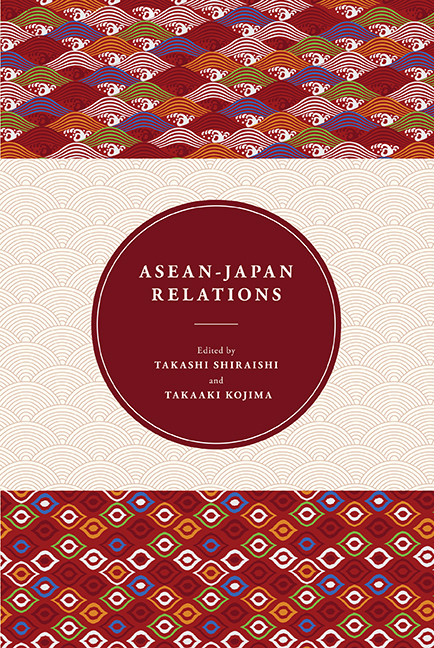Book contents
- Frontmatter
- Contents
- Preface
- About the Contributors
- 1 An Overview of Japan-ASEAN Relations
- 2 Japan's Relations with ASEAN
- 3 Approaches toward Regionalism: Japan, China and the Implications on ASEAN
- 4 The New Japan-ASEAN Partnership: Challenges in the Transformation of the Regional Context in East Asia
- 5 ASEAN-Japan Strategic Partnership and Regional Integration: Impacts and Implications
- 6 ASEAN-Japan Cooperation on Maritime Non-Traditional Security Issues: Toward a New Paradigm
- 7 Japan's Evolving Security Concerns in Maritime Southeast Asia: From Safety of Navigation to “Lake Beijing”
- 8 Evolution of Institutions and Policies for Economic Integration in East Asia: The Rise of China and Changes in the Regional Order
- 9 Managing Integration in East Asia: Behind Border Issues in Japan-ASEAN Trade Agreements
- 10 Regional Financial Cooperation in East Asia: Development and Challenges
- 11 Japanese Development Assistance to ASEAN Countries
- 12 Japanese Foreign Direct Investment in the ASEAN-4 Countries
- 13 Japan's Triple Tsunami
- 14 ASEAN-Japan Relations: A Singapore Perspective
7 - Japan's Evolving Security Concerns in Maritime Southeast Asia: From Safety of Navigation to “Lake Beijing”
Published online by Cambridge University Press: 21 October 2015
- Frontmatter
- Contents
- Preface
- About the Contributors
- 1 An Overview of Japan-ASEAN Relations
- 2 Japan's Relations with ASEAN
- 3 Approaches toward Regionalism: Japan, China and the Implications on ASEAN
- 4 The New Japan-ASEAN Partnership: Challenges in the Transformation of the Regional Context in East Asia
- 5 ASEAN-Japan Strategic Partnership and Regional Integration: Impacts and Implications
- 6 ASEAN-Japan Cooperation on Maritime Non-Traditional Security Issues: Toward a New Paradigm
- 7 Japan's Evolving Security Concerns in Maritime Southeast Asia: From Safety of Navigation to “Lake Beijing”
- 8 Evolution of Institutions and Policies for Economic Integration in East Asia: The Rise of China and Changes in the Regional Order
- 9 Managing Integration in East Asia: Behind Border Issues in Japan-ASEAN Trade Agreements
- 10 Regional Financial Cooperation in East Asia: Development and Challenges
- 11 Japanese Development Assistance to ASEAN Countries
- 12 Japanese Foreign Direct Investment in the ASEAN-4 Countries
- 13 Japan's Triple Tsunami
- 14 ASEAN-Japan Relations: A Singapore Perspective
Summary
In a speech that was due to be delivered in Jakarta on 18 January 2013 — but postponed due to the hostage crisis in Algeria — Japanese Prime Minister Shinzo Abe stressed the vital importance of Asia's maritime domain to Japan:
Japan's national interest lies eternally in keeping Asia's seas unequivocally open, free, and peaceful —in maintaining them as the commons for all the people in the world, where the rule of law is fully realized … In light of our geographic circumstances, the two objectives are natural and fundamental imperatives for Japan, a nation surrounded by ocean and deriving sustenance from those oceans — a nation that views the safety of the seas as its own safety.
That Abe chose to focus on maritime security during his first overseas trip since assuming office on 26 December 2012 was unsurprising for two reasons. First, as an island nation largely bereft of natural resources, Japan depends for its economic prosperity on the free flow of maritime trade. Japan relies on Asia's sea lines of communication (SLOCs) for the transportation of its manufactured goods to world markets and for the importation of natural resources, including more than 90 per cent of its imported energy supplies. SLOC security has been, and remains, a critical national security concern for Japan's leaders, strategic thinkers, and security planners. The SLOCs that thread through the maritime chokepoints of Southeast Asia (including the Malacca-Singapore Straits, Sunda Straits, and Lombok-Makassar Straits) and the South China Sea link the Indian and Pacific Oceans and are therefore of singular importance to Japan's economic well-being and national security. In 2010 Japan's two-way trade with the ten members of the Association of Southeast Asian Nations (ASEAN) amounted to US$214 billion, with South Asia (India, Pakistan, and Bangladesh) to US$17.8 billion, and with the European Union (EU) to US$147 billion — the bulk of this trade being borne along Southeast Asia's sea lanes. Regional sea lanes are routinely utilized also by the Japan Maritime Self Defense Force (JMSDF), including by warships operating in the Indian Ocean as part of international efforts to counter pirates off the coast of Somalia and in the Gulf of Aden.
- Type
- Chapter
- Information
- ASEAN-Japan Relations , pp. 114 - 134Publisher: ISEAS–Yusof Ishak InstitutePrint publication year: 2013



